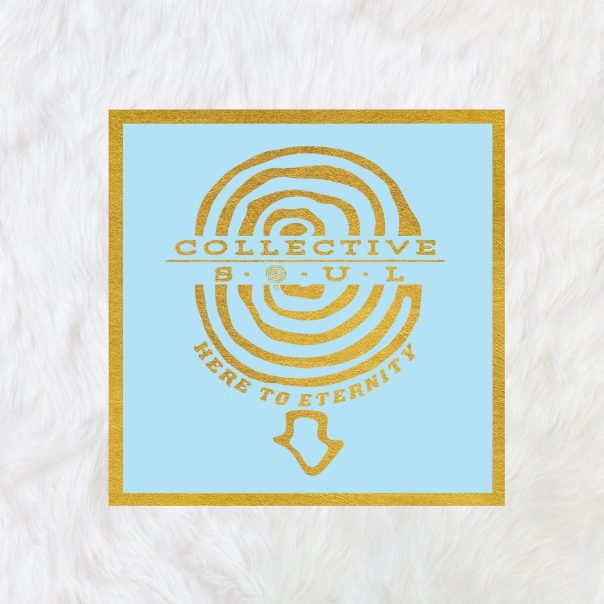REVIEW: Collective Soul still gelling 30 years later, from ‘Here to Eternity’

Collective Soul, “Here to Eternity.”
Georgia alt-rock stalwarts Collective Soul planned to make release a double-album to mark their 25th anniversary in 2019. The band, which went against the grain of ’90s grunge by adding bright melodies and uplifting messages to its songs, reportedly had one ready to go before the pandemic arrived.
Here to Eternity
Collective Soul
Fuzze-Flex x Virgin Music Group, May 17
7/10
Get the album on Amazon Music.
Instead, the band reworked its 10 favorites on the stellar Vibrating, which was released in 2022. But almost immediately, frontman-guitarist Ed Roland and company were back at it in the studio, and the result is the double-album he was seeking, Here to Eternity, just in time for their 30th anniversary.
Roland, his brother Dean Roland (guitar), bassist Will Turpin, drummer Johnny Rabb and guitarist Jesse Triplett (the latter of whom is the newest member, having joined in 2014) recorded their 12th album at Elvis Presley’s estate in Palm Springs. In fact, Collective Soul is just the second act ever to record at the place where Elvis and Priscilla Presley spent their honeymoon in 1967. It’s debatable if the King’s presence is felt in the music, but the album is filled with the band’s own brand of floor-rumbling rock and wistful balladry with a twinge of its Southern roots—even if the package is bigger than it needs to be.
Side 1 of the double album is the stronger half, filled mostly with hard-driving rock songs like pre-release single “Mother’s Love,” “Bluer Than So Blue” and “Let It Flow.” All of these will appeal to fans of “Shine,” “Gel” or “Where the River Flows.”
“Guess we’re all misunderstood/ To what we can and what we should/ Still I find above/ All my strength from mother’s love,” Roland sings on “Mother’s Love,” which opens the album.
In between verses of chugging guitar strumming, steeped heavily in Deep South blues rock, with slide guitar playing by Brian Ray (of Paul McCartney’s band), are bright, shimmering choruses (think: the bright vs. heavy dichotomy of “Heavy,” from 1999’s Dosage).
Thunderous drumming and driving bass make way for a bluesy intro guitar riff on “Bluer Than So Blue,” a melodic rocker that hits hard when it needs to, with vocalist Roland showing off an impressive range, both high and low. “Let It Flow” plays it cool with a refined classic rock swagger and a choppy guitar riff.
“All life’s a show/ Says the devil below/ It’s just a movement of flow/ So let it flow,” he sings.
The band veers closer to an Americana vibe on the country-tinged “Not the Same,” an earnest and no-nonsense anthemic ballad. A lyrical slide guitar solo adds the icing to the cake. “Bob Dylan (Where Are You Today?)” changes up the pace, with a live concert recording and a cheering crowd. The anti-war track cries out for a voice of peace akin to that of Dylan, wishing for “peace, love and better days.”
The rock returns, but the peaceful message rings true on the stomper “Hey Man.” The lyrics are straight and to the point, voicing frustration with an antagonist without a moral compass. The momentum keeps rolling on “Kick It,” which fits into the model of a ’90s-era Collective Soul track, with Roland even singing an extra wordy verse for good measure.
The band turns back the clock on “Matter of Fact,” a raucous old-school bluesy jam—but set to a faster pace, almost like a ska band but without the brass—that brings a dramatic change of pace. Still, the band is tight and delivers a particularly rousing performance, complete with a blazing guitar solo. The exploration continues on “Sister and Mary,” which seems to channel a little Tom Petty and David Bowie. Side 1 ends with transition track “Be the One,” an emotional ballad that strips things down entirely to simply Roland and a piano. He sings to to someone he wants to be his rock, safe harbor and constant.
While the album excels with the rockers, there’s nothing quite like “December” or “The World I Know” on Here to Eternity. So when we get to Side 2, which slows considerably with mid- and downtempo ballads, it starts to buckle a bit under its own weight.
The best of the bunch here include “Words Away,” a hazy, phase-shifted guitar ballad with a silky smooth solo; “La Dee Da,” a slowly simmering ballad highlighted by its lone acoustic guitar, organ and strings before picking up extra oomph through the handclaps and bass line; and “Keep It on Track,” the first tune of Side 2, where the band breaks out its signature guitar tone, an overdriven, Eastern-sounding growl as Ed Roland firmly asserts that the Collective Soul train is plowing forward, even as the landscape changes around him and his bandmates.
As the title of the album suggests, Collective Soul looks at the passage of time heavily on the album; on “Keep It On Track,” as well as ballads “Letter from E” and “Over and Out,” E (Ed) looks both ahead and behind him.
“I know that time’s not easily found/ I don’t have time in my pocket/ Because time never sticks around,” he sings on “Letter from E,” a love ballad.
“No Man’s Land,” a downtempo tune with the growling guitar lines and dystopian and biblical imagery, feels longer than it is surrounded by similar-sounding songs that would be better suited as bonus material for fans who want a deeper dive into Collective Soul.
Mike DeWald contributed to this review. Follow editor Roman Gokhman at Twitter.com/RomiTheWriter.
